Research Assistant Resume Examples

Mar 26, 2025
|
12 min read
Craft your research assistant resume with precision. Learn to conduct a deep dive into your experience, skills, and education. Present yourself as the prime candidate, ready to assist in any research endeavor.
Rated by 348 people
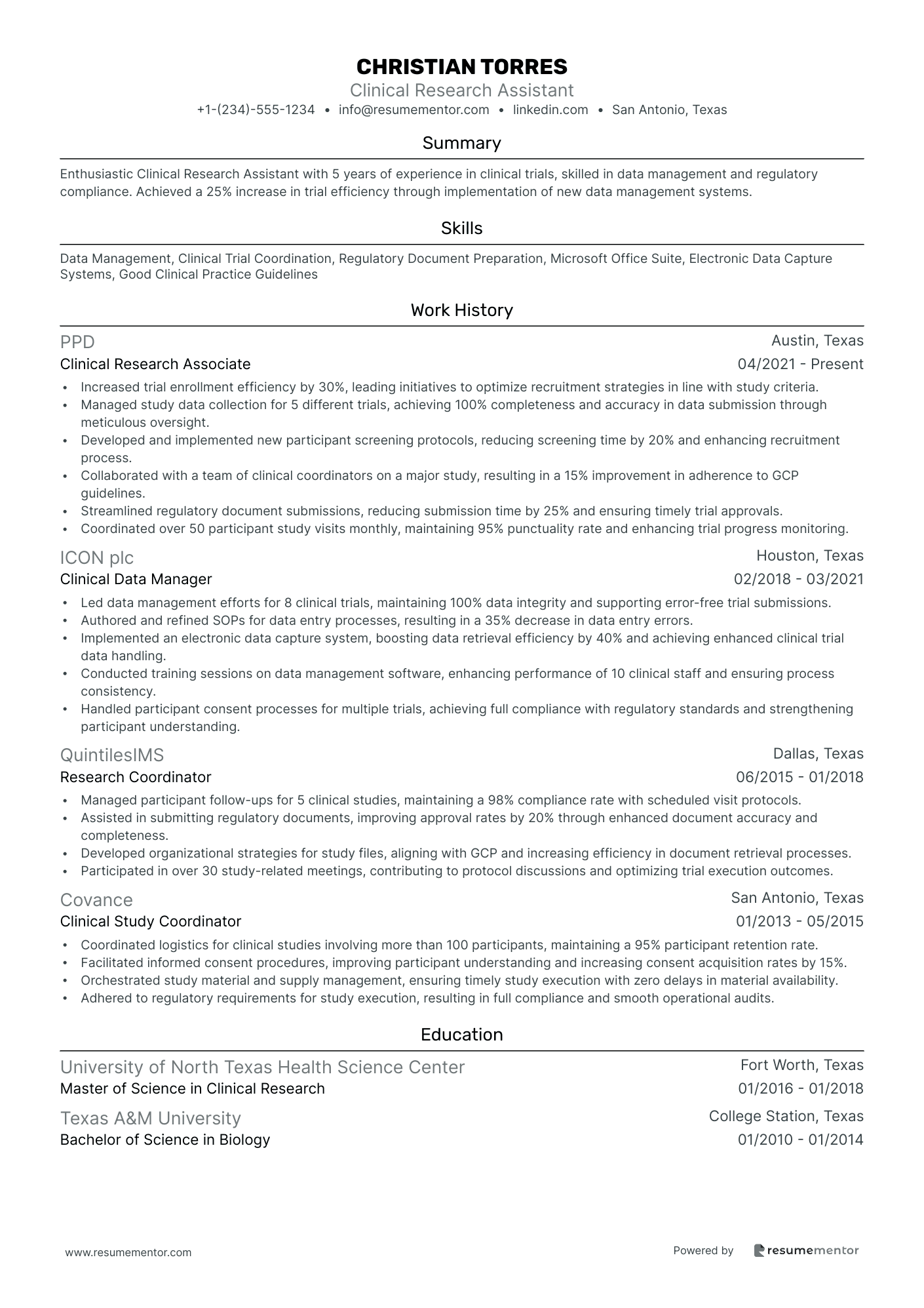
Clinical Research Assistant
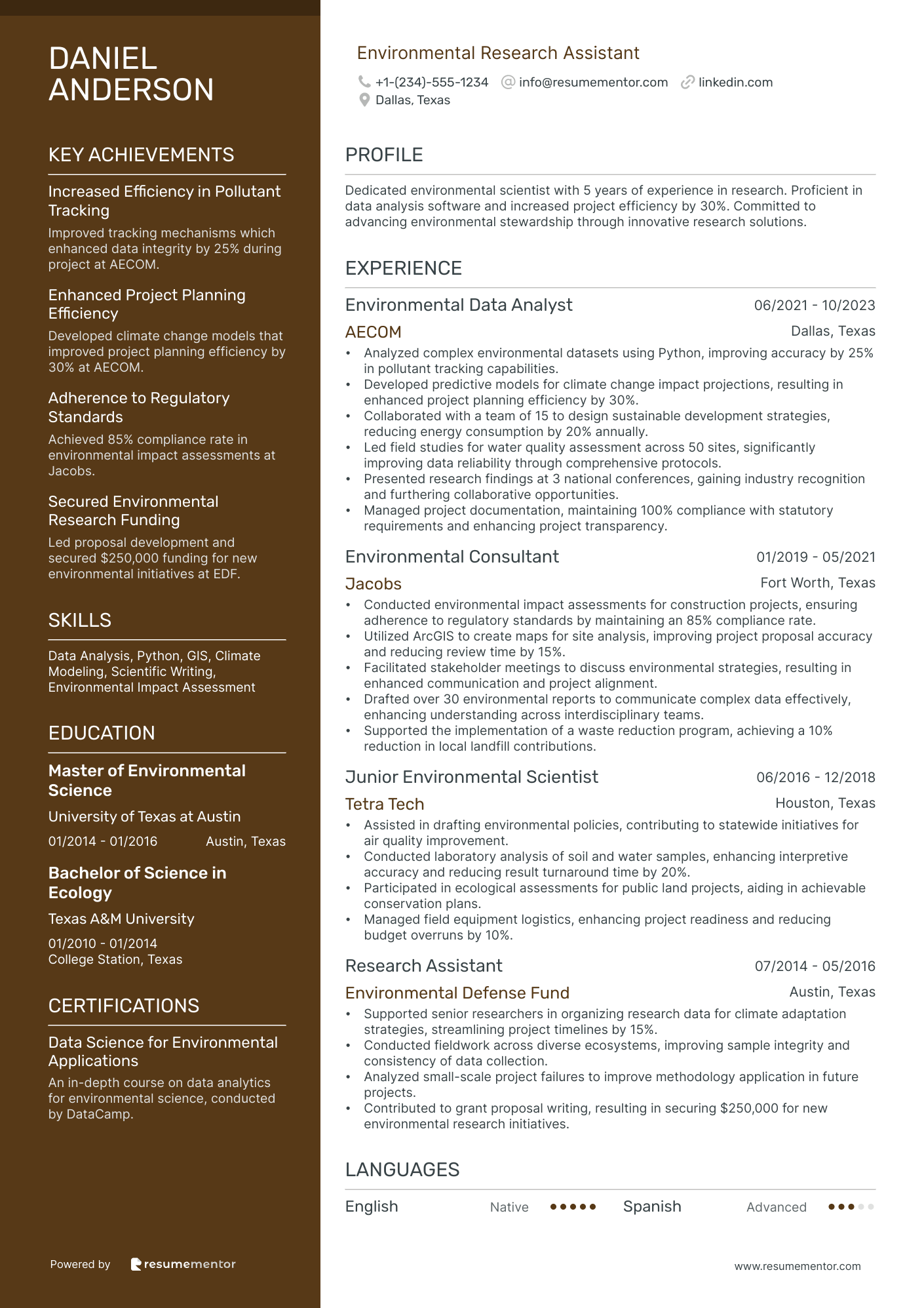
Environmental Research Assistant
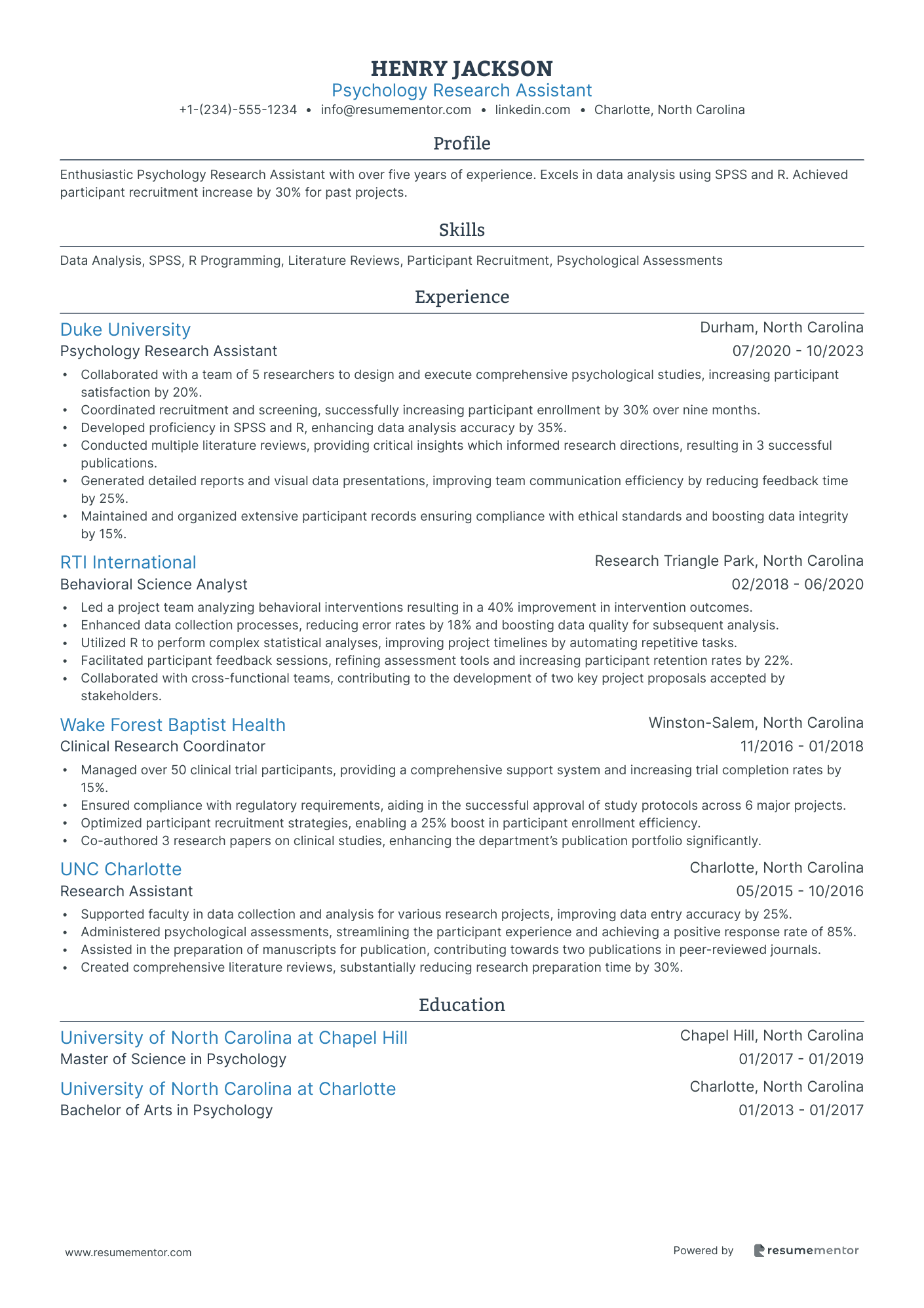
Psychology Research Assistant
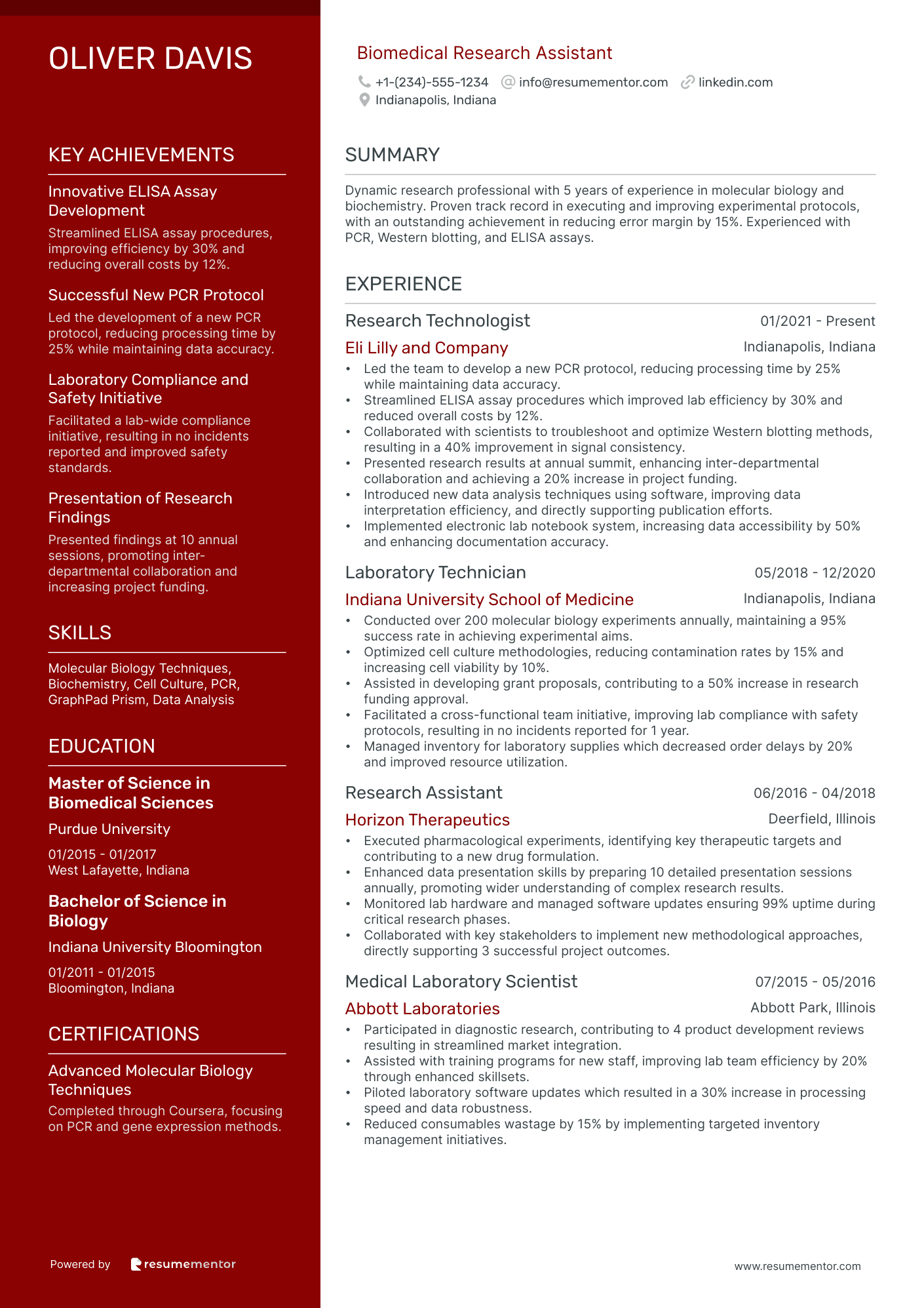
Biomedical Research Assistant
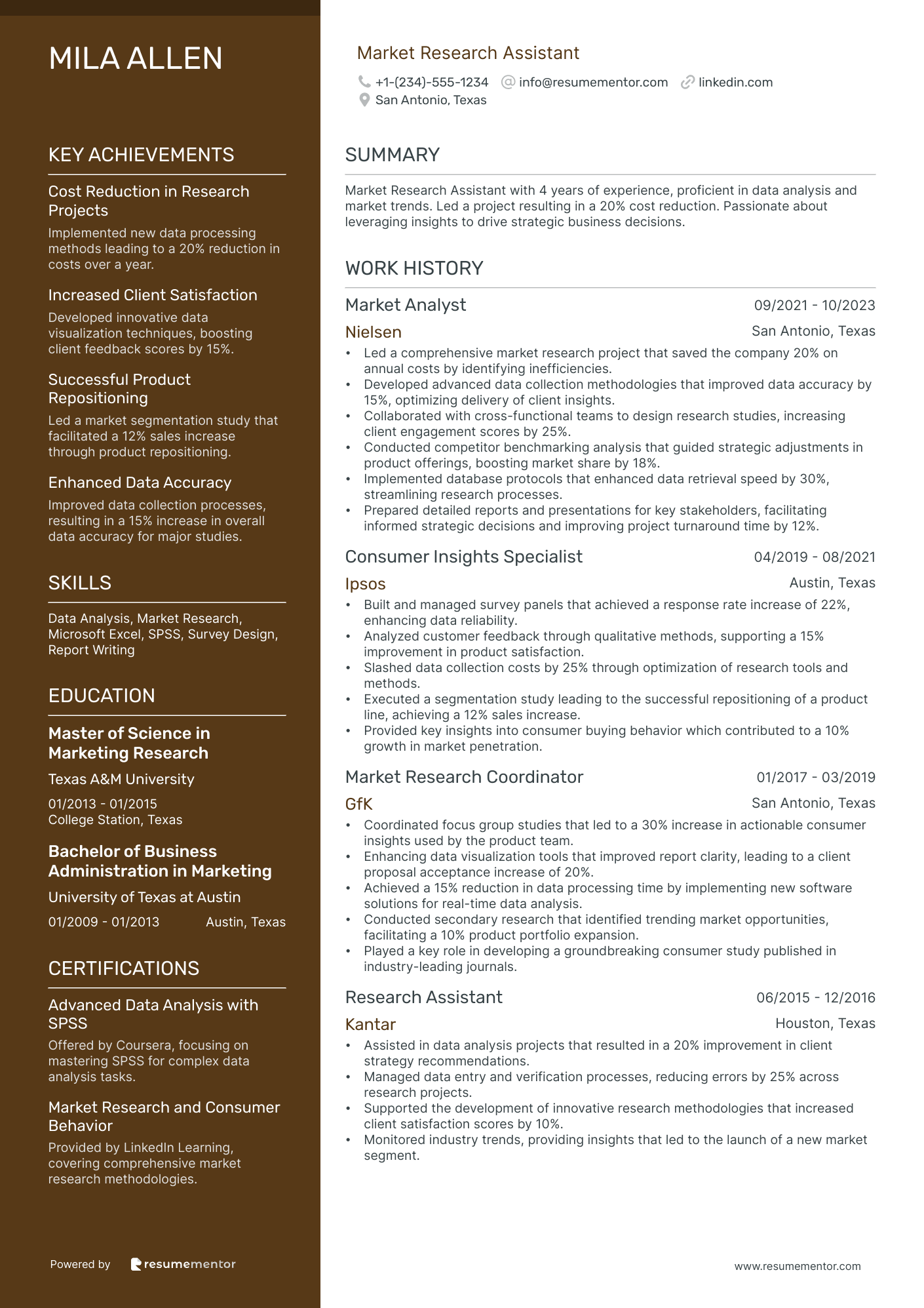
Market Research Assistant
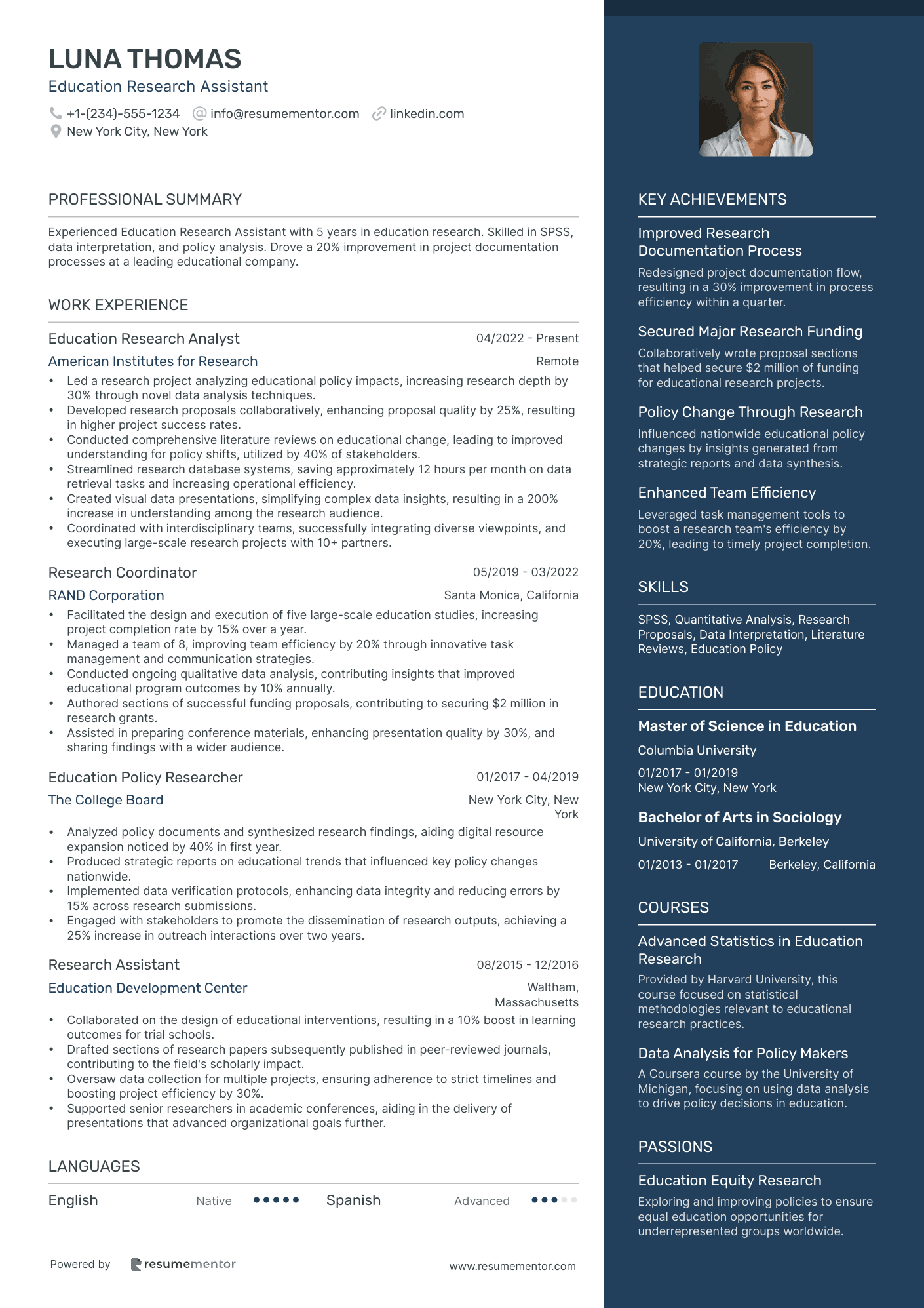
Education Research Assistant
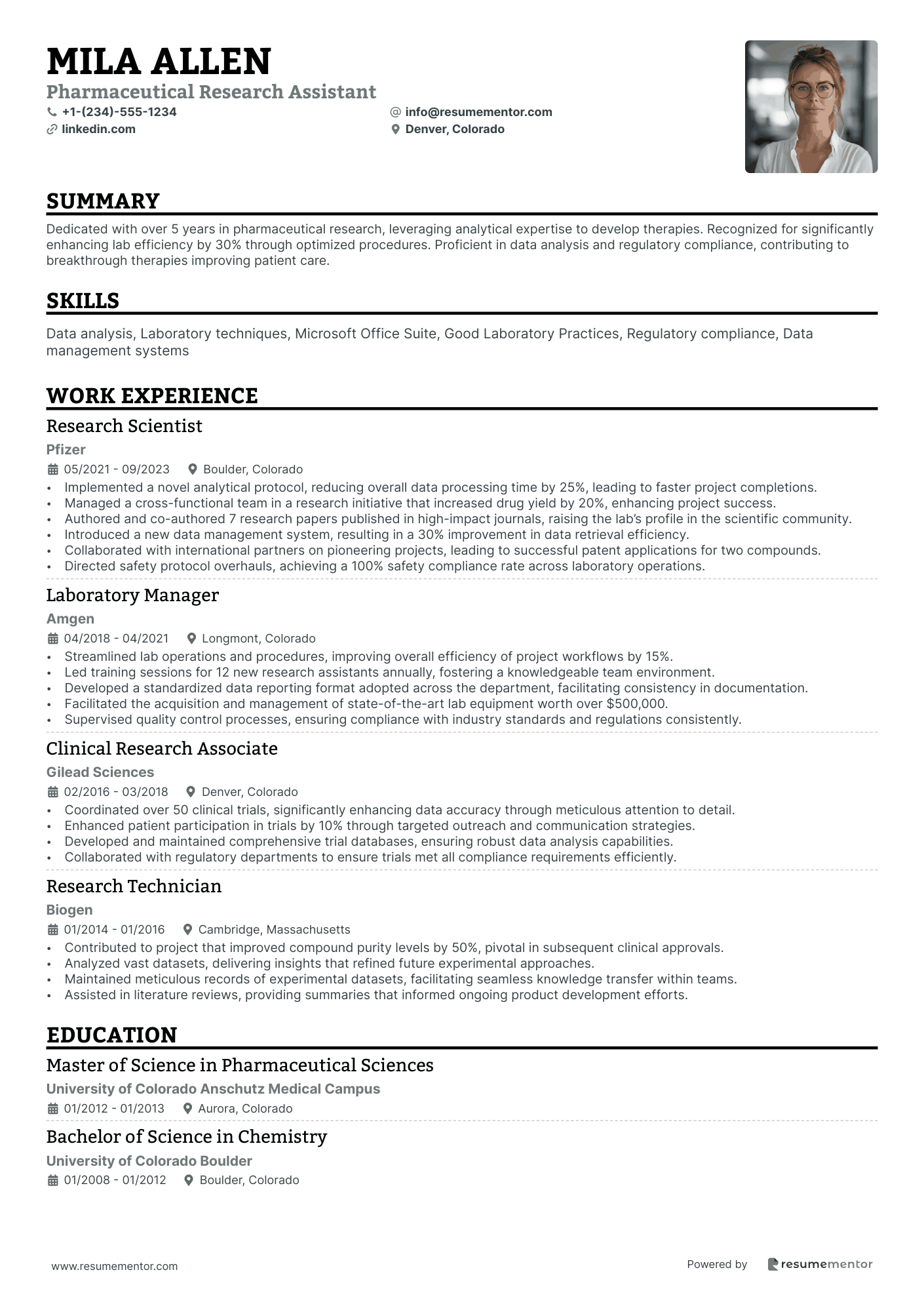
Pharmaceutical Research Assistant
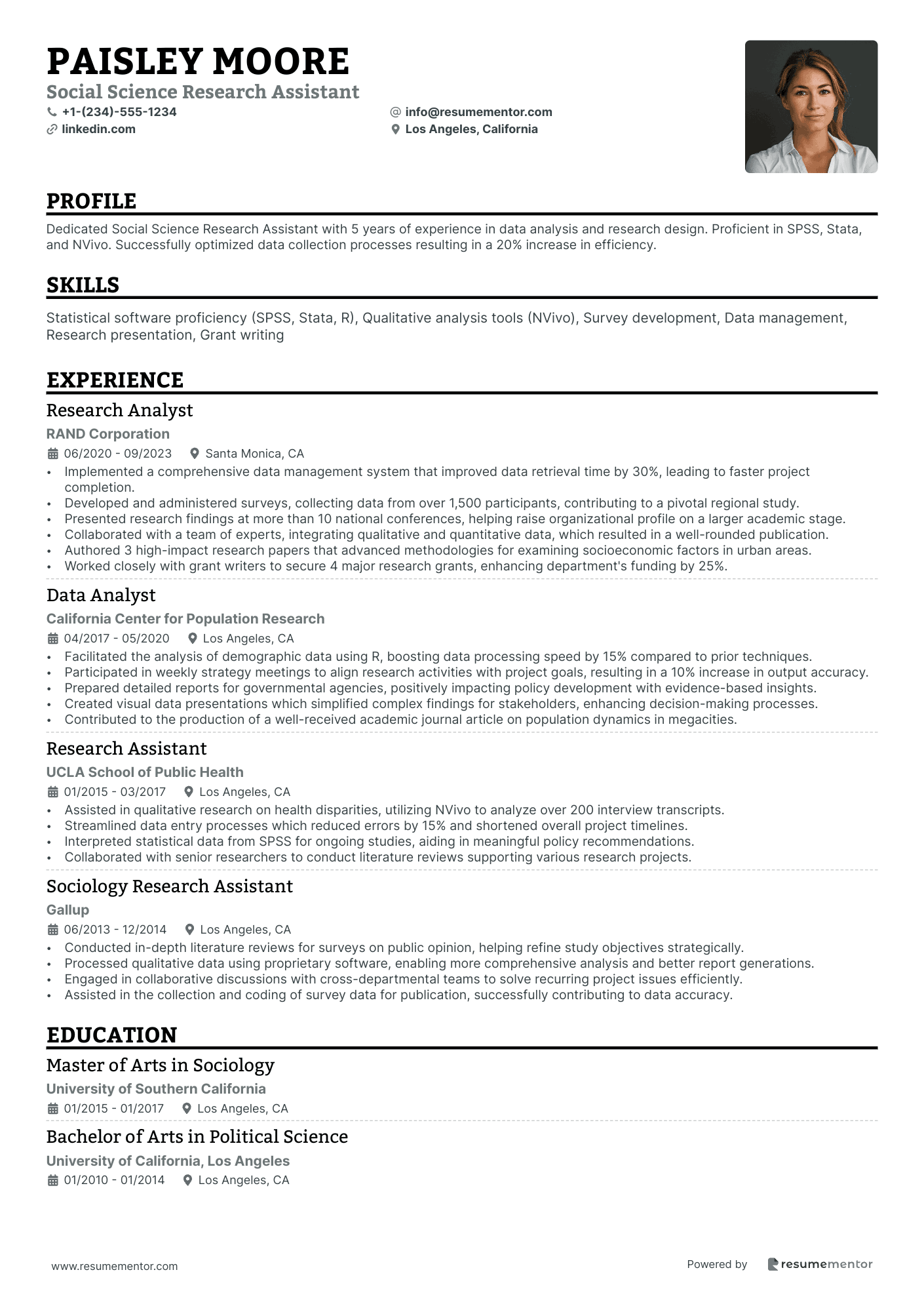
Social Science Research Assistant
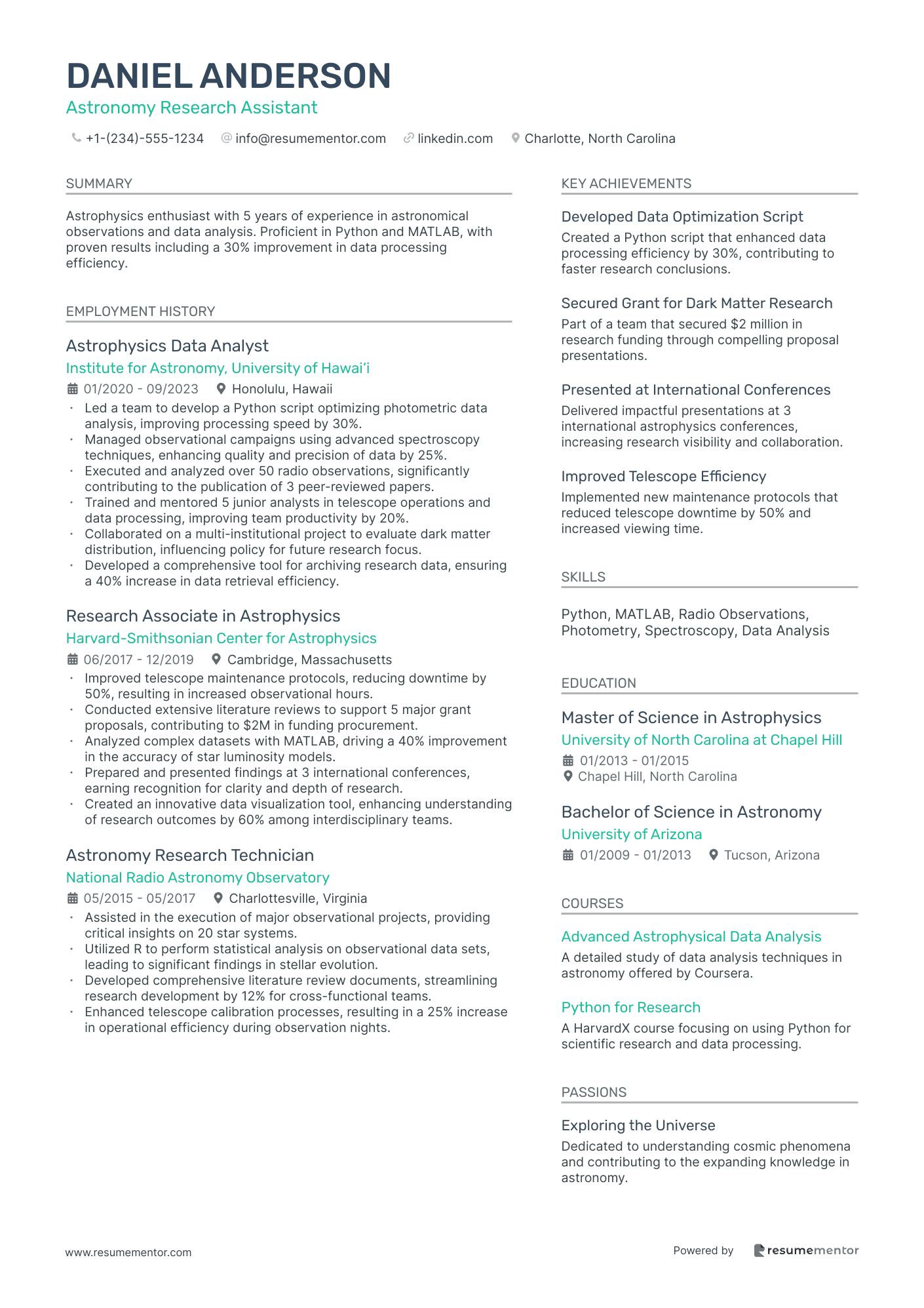
Astronomy Research Assistant
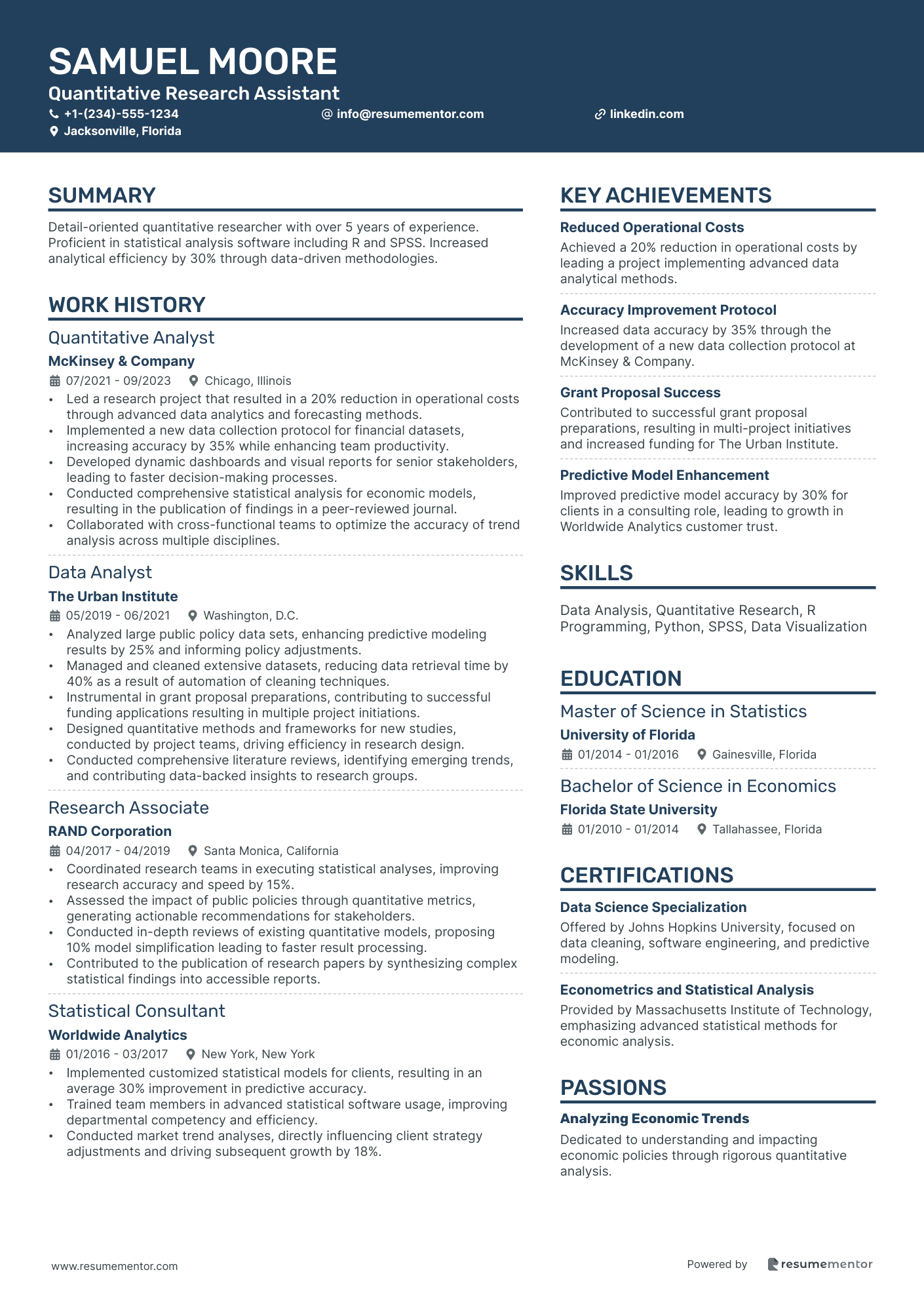
Quantitative Research Assistant

Clinical Research Assistant resume sample
- •Increased trial enrollment efficiency by 30%, leading initiatives to optimize recruitment strategies in line with study criteria.
- •Managed study data collection for 5 different trials, achieving 100% completeness and accuracy in data submission through meticulous oversight.
- •Developed and implemented new participant screening protocols, reducing screening time by 20% and enhancing recruitment process.
- •Collaborated with a team of clinical coordinators on a major study, resulting in a 15% improvement in adherence to GCP guidelines.
- •Streamlined regulatory document submissions, reducing submission time by 25% and ensuring timely trial approvals.
- •Coordinated over 50 participant study visits monthly, maintaining 95% punctuality rate and enhancing trial progress monitoring.
- •Led data management efforts for 8 clinical trials, maintaining 100% data integrity and supporting error-free trial submissions.
- •Authored and refined SOPs for data entry processes, resulting in a 35% decrease in data entry errors.
- •Implemented an electronic data capture system, boosting data retrieval efficiency by 40% and achieving enhanced clinical trial data handling.
- •Conducted training sessions on data management software, enhancing performance of 10 clinical staff and ensuring process consistency.
- •Handled participant consent processes for multiple trials, achieving full compliance with regulatory standards and strengthening participant understanding.
- •Managed participant follow-ups for 5 clinical studies, maintaining a 98% compliance rate with scheduled visit protocols.
- •Assisted in submitting regulatory documents, improving approval rates by 20% through enhanced document accuracy and completeness.
- •Developed organizational strategies for study files, aligning with GCP and increasing efficiency in document retrieval processes.
- •Participated in over 30 study-related meetings, contributing to protocol discussions and optimizing trial execution outcomes.
- •Coordinated logistics for clinical studies involving more than 100 participants, maintaining a 95% participant retention rate.
- •Facilitated informed consent procedures, improving participant understanding and increasing consent acquisition rates by 15%.
- •Orchestrated study material and supply management, ensuring timely study execution with zero delays in material availability.
- •Adhered to regulatory requirements for study execution, resulting in full compliance and smooth operational audits.
Environmental Research Assistant resume sample
- •Analyzed complex environmental datasets using Python, improving accuracy by 25% in pollutant tracking capabilities.
- •Developed predictive models for climate change impact projections, resulting in enhanced project planning efficiency by 30%.
- •Collaborated with a team of 15 to design sustainable development strategies, reducing energy consumption by 20% annually.
- •Led field studies for water quality assessment across 50 sites, significantly improving data reliability through comprehensive protocols.
- •Presented research findings at 3 national conferences, gaining industry recognition and furthering collaborative opportunities.
- •Managed project documentation, maintaining 100% compliance with statutory requirements and enhancing project transparency.
- •Conducted environmental impact assessments for construction projects, ensuring adherence to regulatory standards by maintaining an 85% compliance rate.
- •Utilized ArcGIS to create maps for site analysis, improving project proposal accuracy and reducing review time by 15%.
- •Facilitated stakeholder meetings to discuss environmental strategies, resulting in enhanced communication and project alignment.
- •Drafted over 30 environmental reports to communicate complex data effectively, enhancing understanding across interdisciplinary teams.
- •Supported the implementation of a waste reduction program, achieving a 10% reduction in local landfill contributions.
- •Assisted in drafting environmental policies, contributing to statewide initiatives for air quality improvement.
- •Conducted laboratory analysis of soil and water samples, enhancing interpretive accuracy and reducing result turnaround time by 20%.
- •Participated in ecological assessments for public land projects, aiding in achievable conservation plans.
- •Managed field equipment logistics, enhancing project readiness and reducing budget overruns by 10%.
- •Supported senior researchers in organizing research data for climate adaptation strategies, streamlining project timelines by 15%.
- •Conducted fieldwork across diverse ecosystems, improving sample integrity and consistency of data collection.
- •Analyzed small-scale project failures to improve methodology application in future projects.
- •Contributed to grant proposal writing, resulting in securing $250,000 for new environmental research initiatives.
Psychology Research Assistant resume sample
- •Collaborated with a team of 5 researchers to design and execute comprehensive psychological studies, increasing participant satisfaction by 20%.
- •Coordinated recruitment and screening, successfully increasing participant enrollment by 30% over nine months.
- •Developed proficiency in SPSS and R, enhancing data analysis accuracy by 35%.
- •Conducted multiple literature reviews, providing critical insights which informed research directions, resulting in 3 successful publications.
- •Generated detailed reports and visual data presentations, improving team communication efficiency by reducing feedback time by 25%.
- •Maintained and organized extensive participant records ensuring compliance with ethical standards and boosting data integrity by 15%.
- •Led a project team analyzing behavioral interventions resulting in a 40% improvement in intervention outcomes.
- •Enhanced data collection processes, reducing error rates by 18% and boosting data quality for subsequent analysis.
- •Utilized R to perform complex statistical analyses, improving project timelines by automating repetitive tasks.
- •Facilitated participant feedback sessions, refining assessment tools and increasing participant retention rates by 22%.
- •Collaborated with cross-functional teams, contributing to the development of two key project proposals accepted by stakeholders.
- •Managed over 50 clinical trial participants, providing a comprehensive support system and increasing trial completion rates by 15%.
- •Ensured compliance with regulatory requirements, aiding in the successful approval of study protocols across 6 major projects.
- •Optimized participant recruitment strategies, enabling a 25% boost in participant enrollment efficiency.
- •Co-authored 3 research papers on clinical studies, enhancing the department’s publication portfolio significantly.
- •Supported faculty in data collection and analysis for various research projects, improving data entry accuracy by 25%.
- •Administered psychological assessments, streamlining the participant experience and achieving a positive response rate of 85%.
- •Assisted in the preparation of manuscripts for publication, contributing towards two publications in peer-reviewed journals.
- •Created comprehensive literature reviews, substantially reducing research preparation time by 30%.
Biomedical Research Assistant resume sample
- •Led the team to develop a new PCR protocol, reducing processing time by 25% while maintaining data accuracy.
- •Streamlined ELISA assay procedures which improved lab efficiency by 30% and reduced overall costs by 12%.
- •Collaborated with scientists to troubleshoot and optimize Western blotting methods, resulting in a 40% improvement in signal consistency.
- •Presented research results at annual summit, enhancing inter-departmental collaboration and achieving a 20% increase in project funding.
- •Introduced new data analysis techniques using software, improving data interpretation efficiency, and directly supporting publication efforts.
- •Implemented electronic lab notebook system, increasing data accessibility by 50% and enhancing documentation accuracy.
- •Conducted over 200 molecular biology experiments annually, maintaining a 95% success rate in achieving experimental aims.
- •Optimized cell culture methodologies, reducing contamination rates by 15% and increasing cell viability by 10%.
- •Assisted in developing grant proposals, contributing to a 50% increase in research funding approval.
- •Facilitated a cross-functional team initiative, improving lab compliance with safety protocols, resulting in no incidents reported for 1 year.
- •Managed inventory for laboratory supplies which decreased order delays by 20% and improved resource utilization.
- •Executed pharmacological experiments, identifying key therapeutic targets and contributing to a new drug formulation.
- •Enhanced data presentation skills by preparing 10 detailed presentation sessions annually, promoting wider understanding of complex research results.
- •Monitored lab hardware and managed software updates ensuring 99% uptime during critical research phases.
- •Collaborated with key stakeholders to implement new methodological approaches, directly supporting 3 successful project outcomes.
- •Participated in diagnostic research, contributing to 4 product development reviews resulting in streamlined market integration.
- •Assisted with training programs for new staff, improving lab team efficiency by 20% through enhanced skillsets.
- •Piloted laboratory software updates which resulted in a 30% increase in processing speed and data robustness.
- •Reduced consumables wastage by 15% by implementing targeted inventory management initiatives.
Market Research Assistant resume sample
- •Led a comprehensive market research project that saved the company 20% on annual costs by identifying inefficiencies.
- •Developed advanced data collection methodologies that improved data accuracy by 15%, optimizing delivery of client insights.
- •Collaborated with cross-functional teams to design research studies, increasing client engagement scores by 25%.
- •Conducted competitor benchmarking analysis that guided strategic adjustments in product offerings, boosting market share by 18%.
- •Implemented database protocols that enhanced data retrieval speed by 30%, streamlining research processes.
- •Prepared detailed reports and presentations for key stakeholders, facilitating informed strategic decisions and improving project turnaround time by 12%.
- •Built and managed survey panels that achieved a response rate increase of 22%, enhancing data reliability.
- •Analyzed customer feedback through qualitative methods, supporting a 15% improvement in product satisfaction.
- •Slashed data collection costs by 25% through optimization of research tools and methods.
- •Executed a segmentation study leading to the successful repositioning of a product line, achieving a 12% sales increase.
- •Provided key insights into consumer buying behavior which contributed to a 10% growth in market penetration.
- •Coordinated focus group studies that led to a 30% increase in actionable consumer insights used by the product team.
- •Enhancing data visualization tools that improved report clarity, leading to a client proposal acceptance increase of 20%.
- •Achieved a 15% reduction in data processing time by implementing new software solutions for real-time data analysis.
- •Conducted secondary research that identified trending market opportunities, facilitating a 10% product portfolio expansion.
- •Played a key role in developing a groundbreaking consumer study published in industry-leading journals.
- •Assisted in data analysis projects that resulted in a 20% improvement in client strategy recommendations.
- •Managed data entry and verification processes, reducing errors by 25% across research projects.
- •Supported the development of innovative research methodologies that increased client satisfaction scores by 10%.
- •Monitored industry trends, providing insights that led to the launch of a new market segment.
Education Research Assistant resume sample
- •Led a research project analyzing educational policy impacts, increasing research depth by 30% through novel data analysis techniques.
- •Developed research proposals collaboratively, enhancing proposal quality by 25%, resulting in higher project success rates.
- •Conducted comprehensive literature reviews on educational change, leading to improved understanding for policy shifts, utilized by 40% of stakeholders.
- •Streamlined research database systems, saving approximately 12 hours per month on data retrieval tasks and increasing operational efficiency.
- •Created visual data presentations, simplifying complex data insights, resulting in a 200% increase in understanding among the research audience.
- •Coordinated with interdisciplinary teams, successfully integrating diverse viewpoints, and executing large-scale research projects with 10+ partners.
- •Facilitated the design and execution of five large-scale education studies, increasing project completion rate by 15% over a year.
- •Managed a team of 8, improving team efficiency by 20% through innovative task management and communication strategies.
- •Conducted ongoing qualitative data analysis, contributing insights that improved educational program outcomes by 10% annually.
- •Authored sections of successful funding proposals, contributing to securing $2 million in research grants.
- •Assisted in preparing conference materials, enhancing presentation quality by 30%, and sharing findings with a wider audience.
- •Analyzed policy documents and synthesized research findings, aiding digital resource expansion noticed by 40% in first year.
- •Produced strategic reports on educational trends that influenced key policy changes nationwide.
- •Implemented data verification protocols, enhancing data integrity and reducing errors by 15% across research submissions.
- •Engaged with stakeholders to promote the dissemination of research outputs, achieving a 25% increase in outreach interactions over two years.
- •Collaborated on the design of educational interventions, resulting in a 10% boost in learning outcomes for trial schools.
- •Drafted sections of research papers subsequently published in peer-reviewed journals, contributing to the field's scholarly impact.
- •Oversaw data collection for multiple projects, ensuring adherence to strict timelines and boosting project efficiency by 30%.
- •Supported senior researchers in academic conferences, aiding in the delivery of presentations that advanced organizational goals further.
Pharmaceutical Research Assistant resume sample
- •Implemented a novel analytical protocol, reducing overall data processing time by 25%, leading to faster project completions.
- •Managed a cross-functional team in a research initiative that increased drug yield by 20%, enhancing project success.
- •Authored and co-authored 7 research papers published in high-impact journals, raising the lab’s profile in the scientific community.
- •Introduced a new data management system, resulting in a 30% improvement in data retrieval efficiency.
- •Collaborated with international partners on pioneering projects, leading to successful patent applications for two compounds.
- •Directed safety protocol overhauls, achieving a 100% safety compliance rate across laboratory operations.
- •Streamlined lab operations and procedures, improving overall efficiency of project workflows by 15%.
- •Led training sessions for 12 new research assistants annually, fostering a knowledgeable team environment.
- •Developed a standardized data reporting format adopted across the department, facilitating consistency in documentation.
- •Facilitated the acquisition and management of state-of-the-art lab equipment worth over $500,000.
- •Supervised quality control processes, ensuring compliance with industry standards and regulations consistently.
- •Coordinated over 50 clinical trials, significantly enhancing data accuracy through meticulous attention to detail.
- •Enhanced patient participation in trials by 10% through targeted outreach and communication strategies.
- •Developed and maintained comprehensive trial databases, ensuring robust data analysis capabilities.
- •Collaborated with regulatory departments to ensure trials met all compliance requirements efficiently.
- •Contributed to project that improved compound purity levels by 50%, pivotal in subsequent clinical approvals.
- •Analyzed vast datasets, delivering insights that refined future experimental approaches.
- •Maintained meticulous records of experimental datasets, facilitating seamless knowledge transfer within teams.
- •Assisted in literature reviews, providing summaries that informed ongoing product development efforts.
Social Science Research Assistant resume sample
- •Implemented a comprehensive data management system that improved data retrieval time by 30%, leading to faster project completion.
- •Developed and administered surveys, collecting data from over 1,500 participants, contributing to a pivotal regional study.
- •Presented research findings at more than 10 national conferences, helping raise organizational profile on a larger academic stage.
- •Collaborated with a team of experts, integrating qualitative and quantitative data, which resulted in a well-rounded publication.
- •Authored 3 high-impact research papers that advanced methodologies for examining socioeconomic factors in urban areas.
- •Worked closely with grant writers to secure 4 major research grants, enhancing department's funding by 25%.
- •Facilitated the analysis of demographic data using R, boosting data processing speed by 15% compared to prior techniques.
- •Participated in weekly strategy meetings to align research activities with project goals, resulting in a 10% increase in output accuracy.
- •Prepared detailed reports for governmental agencies, positively impacting policy development with evidence-based insights.
- •Created visual data presentations which simplified complex findings for stakeholders, enhancing decision-making processes.
- •Contributed to the production of a well-received academic journal article on population dynamics in megacities.
- •Assisted in qualitative research on health disparities, utilizing NVivo to analyze over 200 interview transcripts.
- •Streamlined data entry processes which reduced errors by 15% and shortened overall project timelines.
- •Interpreted statistical data from SPSS for ongoing studies, aiding in meaningful policy recommendations.
- •Collaborated with senior researchers to conduct literature reviews supporting various research projects.
- •Conducted in-depth literature reviews for surveys on public opinion, helping refine study objectives strategically.
- •Processed qualitative data using proprietary software, enabling more comprehensive analysis and better report generations.
- •Engaged in collaborative discussions with cross-departmental teams to solve recurring project issues efficiently.
- •Assisted in the collection and coding of survey data for publication, successfully contributing to data accuracy.
Astronomy Research Assistant resume sample
- •Led a team to develop a Python script optimizing photometric data analysis, improving processing speed by 30%.
- •Managed observational campaigns using advanced spectroscopy techniques, enhancing quality and precision of data by 25%.
- •Executed and analyzed over 50 radio observations, significantly contributing to the publication of 3 peer-reviewed papers.
- •Trained and mentored 5 junior analysts in telescope operations and data processing, improving team productivity by 20%.
- •Collaborated on a multi-institutional project to evaluate dark matter distribution, influencing policy for future research focus.
- •Developed a comprehensive tool for archiving research data, ensuring a 40% increase in data retrieval efficiency.
- •Improved telescope maintenance protocols, reducing downtime by 50%, resulting in increased observational hours.
- •Conducted extensive literature reviews to support 5 major grant proposals, contributing to $2M in funding procurement.
- •Analyzed complex datasets with MATLAB, driving a 40% improvement in the accuracy of star luminosity models.
- •Prepared and presented findings at 3 international conferences, earning recognition for clarity and depth of research.
- •Created an innovative data visualization tool, enhancing understanding of research outcomes by 60% among interdisciplinary teams.
- •Assisted in the execution of major observational projects, providing critical insights on 20 star systems.
- •Utilized R to perform statistical analysis on observational data sets, leading to significant findings in stellar evolution.
- •Developed comprehensive literature review documents, streamlining research development by 12% for cross-functional teams.
- •Enhanced telescope calibration processes, resulting in a 25% increase in operational efficiency during observation nights.
- •Coordinated data collection and analysis efforts for 15 projects, supporting 5 graduate theses with robust data.
- •Implemented new photometric analysis techniques using MATLAB, improving accuracy of luminosity data by 22%.
- •Collaborated in weekly research meetings, providing data-driven insights that improved research approaches by 15%.
- •Ensured optimal telescope functionality, facilitating seamless execution of multiple nighttime observational schedules.
Quantitative Research Assistant resume sample
- •Led a research project that resulted in a 20% reduction in operational costs through advanced data analytics and forecasting methods.
- •Implemented a new data collection protocol for financial datasets, increasing accuracy by 35% while enhancing team productivity.
- •Developed dynamic dashboards and visual reports for senior stakeholders, leading to faster decision-making processes.
- •Conducted comprehensive statistical analysis for economic models, resulting in the publication of findings in a peer-reviewed journal.
- •Collaborated with cross-functional teams to optimize the accuracy of trend analysis across multiple disciplines.
- •Analyzed large public policy data sets, enhancing predictive modeling results by 25% and informing policy adjustments.
- •Managed and cleaned extensive datasets, reducing data retrieval time by 40% as a result of automation of cleaning techniques.
- •Instrumental in grant proposal preparations, contributing to successful funding applications resulting in multiple project initiations.
- •Designed quantitative methods and frameworks for new studies, conducted by project teams, driving efficiency in research design.
- •Conducted comprehensive literature reviews, identifying emerging trends, and contributing data-backed insights to research groups.
- •Coordinated research teams in executing statistical analyses, improving research accuracy and speed by 15%.
- •Assessed the impact of public policies through quantitative metrics, generating actionable recommendations for stakeholders.
- •Conducted in-depth reviews of existing quantitative models, proposing 10% model simplification leading to faster result processing.
- •Contributed to the publication of research papers by synthesizing complex statistical findings into accessible reports.
- •Implemented customized statistical models for clients, resulting in an average 30% improvement in predictive accuracy.
- •Trained team members in advanced statistical software usage, improving departmental competency and efficiency.
- •Conducted market trend analyses, directly influencing client strategy adjustments and driving subsequent growth by 18%.
As a research assistant, you dive deep into the world of data and discovery, but translating that intricate work into a standout resume can feel like capturing a whirlwind in a jar. A well-crafted resume is your ticket to showcasing research skills and grabbing the attention of hiring managers. Each section of your resume should seamlessly highlight key abilities, from your analytical expertise to experiences working collaboratively in labs.
Navigating through all this information can be overwhelming, which is why using a resume template is invaluable. These templates provide a structured format, making it easier to effectively communicate your strengths and achievements resume templates. With a solid structure in place, you can focus on painting a vivid picture of how your work contributes to impactful results.
Instead of just listing tasks, think about how to demonstrate your ability to conduct research, solve problems, and thrive in team settings. Employers seek these qualities, and your resume should reflect them clearly.
Picture your resume as an ongoing experiment: you're constantly testing, refining, and updating it as your career progresses. Just like your research work, attention to detail and precision are crucial. A well-structured resume is your first step toward a rewarding career path.
Key Takeaways
- A well-crafted resume for a research assistant should highlight analytical skills, attention to detail, and research project management experience.
- Using a resume template helps structure information clearly, allowing candidates to effectively showcase their strengths and accomplishments.
- A resume should demonstrate problem-solving abilities, the capacity to work collaboratively, and the relevance of past research work to potential employers.
- Choosing the right resume format—chronological, functional, or combination—can accentuate the applicant's experience and skills effectively.
- Including sections like skills, education, certificates, and extra sections such as language proficiency or volunteer work can enhance a resume’s appeal.
What to focus on when writing your research assistant resume
A research assistant resume should effectively highlight your analytical skills, attention to detail, and ability to manage research projects. This helps communicate your research expertise and demonstrate how you can add value in a research setting.
How to structure your research assistant resume
- Contact Information: Start with your full name, phone number, professional email, and LinkedIn URL. Being easily reachable is crucial for opportunities. Ensure your contact details are current and professional—this small detail sets the tone for the recruiter’s first impression and reflects your professionalism right off the bat, signaling your readiness for communication.
- Objective or Summary: Next, write a brief summary concentrating on your research skills and experience. This sets the tone for what you aim to bring to the role. Tailor this section to the specific job and its requirements, demonstrating a clear alignment with what the employer is seeking. This will be a snapshot of your capabilities and aspirations, intriguing the recruiter to learn more about your background.
- Education: Follow up with your educational background, listing your degrees, institutions, and graduation dates. Include relevant coursework or honors to further align with the research field. Highlight aspects that connect directly to research tasks, such as your involvement in research projects or specific subjects studied that are pertinent to the position, showcasing your foundational knowledge.
- Research Experience: Then, detail your past research roles, responsibilities, and achievements. This is your chance to highlight skills such as data analysis, lab management, and collaboration. Describe contributions to significant projects or how you applied problem-solving skills to research challenges, which grounds your research assistant capabilities in real-world experience and shows your potential to future employers.
- Technical Skills: Complement your experience with specific technical skills, such as proficiency in statistical software or laboratory techniques, as these are key in research work. Point out tools and technologies you excel at that are specifically relevant to the research field you're applying to, reinforcing your ability to handle technical tasks efficiently and effectively.
- Publications and Presentations: Wrap up with any papers, articles, or presentations you’ve contributed to. These elements showcase your active involvement in academia and research. Mention any collaborative efforts or contributions to team projects which highlight your ability to work well within a group setting and your impact within academic circles.
By structuring your research assistant resume in this way, each section communicates a different aspect of your capabilities, laying the groundwork for in-depth insights into each section's content below as we delve into resume format.
Which resume format to choose
Creating a resume for a research assistant role involves presenting your information in a way that highlights your academic background and relevant skills. Start with a clear format; if your experience follows a traditional career path, a chronological format helps potential employers track your progress easily. On the other hand, a functional format is ideal if you need to emphasize specific research skills or technical proficiencies that make you a strong candidate for the role. If your background is diverse, a combination format can effectively blend your experience and skills, allowing you to present a well-rounded profile.
The font choice may seem minor but adds to the first impression. Using modern fonts like Montserrat, Raleway, or Lato not only refreshes your resume’s appearance but also reflects a readiness to embrace contemporary standards and technology, aspects important in research. While styling, remember to convert your document into a PDF before sending it out. PDFs maintain your layout perfectly across different devices, ensuring your resume appears polished and professional each time it’s opened.
Finally, maintain one-inch margins all around to ensure your resume is easy to read and looks uncluttered. Adequate white space is as important as the content because it guides the reader’s eye through your resume naturally, emphasizing your important achievements and skills without overwhelming. This thoughtful organization is crucial in a field that values precision and clarity.
How to write a quantifiable resume experience section
To craft a standout research assistant resume experience section, it’s important to highlight relevant accomplishments and skills that directly relate to the role. Start by clearly conveying your achievements, focusing on how they contributed to past projects and teams. Structure your experience chronologically, beginning with the most recent roles to keep the information current and impactful. This helps in showcasing your growth and relevance in the field. Include job titles that are connected to research or closely related fields to maintain relevance.
Tailoring each resume specifically to the job ad adds value by incorporating keywords and skills mentioned in the listing. Utilize action words such as "analyzed," "developed," "coordinated," and "implemented" as they effectively convey the impact of your work. Keeping your employment history relevant within the last 10-15 years ensures all the listed experience is meaningful.
When you align your resume with each specific job description, adjust your language to align with the employer’s priorities and highlight measurable achievements. Providing clear data points showcases your past successes in a tangible way, making your contributions undeniable.
Here's a refined example for a research assistant experience section:
- •Coordinated over 15 psychology experiments, boosting data accuracy by 25%.
- •Developed data analysis protocols with Python, cutting analysis time by 30%.
- •Authored 3 research papers published in top psychology journals.
- •Helped in grant writing, contributing to securing $100,000 in research funding.
By emphasizing interconnected achievements, this experience section naturally flows, linking each aspect of your roles. Each bullet point not only outlines specific tasks but also ties back to the broader goal of enhancing research outcomes. The language and structure together create a cohesive narrative of how your skills and efforts have directly translated into measurable success within the field.
Result-Focused resume experience section
A result-focused research assistant resume experience section should clearly convey the impact of your work to potential employers. Begin by showcasing how your contributions led to tangible outcomes, shifting the focus from duties to achievements. Highlight the impact by including specifics, like accomplishments, discoveries, or improvements you drove, using action verbs and quantifying your achievements with percentages, numbers, or awards. Each description should be both concise and informative, painting a vivid picture of how your work made a difference.
As you detail your experiences, ensure that each bullet point flows naturally into the next, illustrating your role and its significance in projects. Mention the methodologies, tools, or skills that were essential to your success, which helps to reveal your expertise and working style. Tailor your experience section to what the employer values by aligning it with the job description, ensuring your resume resonates with their priorities.
Research Assistant
City University Science Department
June 2021 - May 2023
- Conducted data analysis using SPSS, uncovering a 30% rise in local pollution levels, which guided further research.
- Worked seamlessly with a team of four to design and execute field studies, culminating in the publication of two journal articles.
- Developed a database that significantly enhanced data retrieval by 40%, directly boosting research efficiency.
- Presented findings at the annual Environmental Science Conference, attracting investment from two sponsors and expanding project scope.
Project-Focused resume experience section
A project-focused research assistant resume experience section should highlight your key contributions and illustrate the skills you've applied through projects you've tackled. Start by pinpointing the projects most relevant to the job you’re targeting. By using vivid and active language, you can clearly convey your direct involvement and the impact of your work. Demonstrate specific accomplishments and measurable outcomes to showcase the tangible value you offer to potential employers.
When detailing your projects, break the information into concise bullet points that are easy to digest. Each bullet should begin with a strong action verb to emphasize your active role. Balance descriptions of your technical skills with examples of how you applied these skills effectively, shedding light on both your expertise and your approach. This method paints a comprehensive picture of your capabilities, helping employers envision you as an asset to their team.
Research Assistant
GreenTech Research Lab
June 2021 - August 2022
- Collaborated with a team of 5 to analyze the impact of climate change on local biodiversity, using statistical models to predict trends.
- Managed and organized a database of over 10,000 samples, improving data retrieval efficiency by 30%.
- Presented findings at the National Environment Science Conference, increasing department visibility within the research community.
- Assisted in securing a $50,000 grant by developing compelling proposals and outlining project significance.
Skills-Focused resume experience section
A skills-focused research assistant resume experience section should clearly highlight your abilities and achievements while effectively connecting each aspect of your work. Start by outlining the specific skills and responsibilities you held, and explain the impact your work had. By using active verbs and including numbers to quantify your achievements, you provide a clear picture of your expertise and the value you bring to a potential employer.
Organize the details in a way that naturally flows and relates to the job you want. Start with the skills and accomplishments most relevant to the position, and break down your tasks into bullet points that illustrate both your duties and the results you achieved. This approach not only showcases your ability to conduct, analyze, and report on research but also ties together each element of your experience to present a cohesive narrative.
Research Assistant
XYZ University
June 2020 - August 2023
- Conducted extensive literature reviews to gather relevant research topics.
- Assisted in the design and implementation of data collection methods.
- Analyzed data using statistical software, improving research efficiency by 20%.
- Presented research findings in weekly meetings, enhancing team communication.
Collaboration-Focused resume experience section
A collaboration-focused research assistant resume experience section should highlight how your teamwork skills have driven the success of various projects. Start by noting your job title and workplace, emphasizing any specific strategies or methods that set you apart. Use active language to weave a narrative of your role in team efforts, and detail the positive outcomes your contributions helped achieve. Specify your achievements and spotlight skills like communication, teamwork, or relevant technical expertise that bolstered your performance.
Enrich your account with examples of projects or tasks where your collaborative efforts made a significant impact, ensuring these anecdotes are seamlessly linked to your past successes. Quantifying results can add more weight and context to your accomplishments. The ultimate aim is to illustrate how your collaboration abilities have actively enhanced research endeavors. Here’s how you can structure a detailed entry in JSON format:
Research Assistant
XYZ University
June 2021 - Present
- Worked with a team of 5 researchers to analyze data for a cancer study, improving accuracy by 30%.
- Organized regular team meetings to keep everyone aligned on goals and timelines.
- Created a new data-sharing protocol that made the data collection process more efficient.
- Joined forces with external experts to gather insights, enhancing the quality and scope of the research.
Write your research assistant resume summary section
A research-focused resume summary should offer a coherent snapshot of your capabilities and aspirations. When you're applying for a research assistant role, a well-crafted summary can make a strong first impression. If you've accumulated substantial experience, a resume summary can highlight your expertise. Here's an example:
This summary succinctly emphasizes your comprehensive experience, skills, and notable achievements, which immediately showcases your suitability for the role. For those just entering the field, a resume objective might better convey your enthusiasm and potential. Consider this approach:
[here was the JSON object 2]
This objective highlights your aspirations and transferable skills, reflecting your eagerness to grow. Understanding the difference between a summary and an objective is crucial, as it often hinges on your level of experience. While a summary highlights professional achievements, an objective underscores career goals. You might also encounter terms like a resume profile, which is similar to a summary but often highlights your style and character. A summary of qualifications, meanwhile, can offer a bullet-pointed list of skills. The key is to tailor this section to the job description, spotlighting your most relevant experiences or ambitions. Keep it concise yet impactful to quickly catch a recruiter’s attention.
Listing your research assistant skills on your resume
A skills-focused research assistant resume should clearly highlight your strengths and abilities. Start by considering whether to dedicate a specific section to skills or weave them into other areas like experience and summary. Your strengths and soft skills reflect personal traits that enhance workplace interactions, while hard skills are specific abilities like data analysis or proficiency in statistical software.
Effectively incorporating skills and strengths into your resume transforms them into crucial keywords. These keywords help align your resume with employer expectations and are vital for catching the attention of automated systems scanning for specific qualifications. This clarity ensures potential employers quickly grasp your capabilities.
This standalone skills section effectively lays out your core competencies for easy viewing. By focusing on skills relevant to a research assistant, like data analysis and software proficiency, you effectively communicate technical abilities to hiring managers. Adding skills like critical thinking and time management further illustrates your problem-solving capacity and work efficiency.
Best hard skills to feature on your research assistant resume
Hard skills on a research assistant resume should underscore your technical expertise and ability to conduct thorough research. Demonstrating your prowess in data management, analysis, and technical elements of research processes is essential.
Hard Skills
- Quantitative Analysis
- Qualitative Research
- Data Management
- Laboratory Techniques
- Advanced Excel Skills
- Database Management
- Programming (e.g., Python, R)
- Survey Design
- Geographic Information Systems (GIS)
- Molecular Biology Techniques
- SPSS/SAS Expertise
- Data Visualization
- Academic Writing
- Web-based Research
- Scholarly Communication
Best soft skills to feature on your research assistant resume
Soft skills are indispensable for a research assistant's role, enhancing collaboration, communication, and problem-solving abilities. These skills reflect your capacity to interact effectively with colleagues and adapt to the evolving demands of research environments.
Soft Skills
- Attention to Detail
- Communication
- Teamwork
- Adaptability
- Problem Solving
- Interpersonal Skills
- Ethical Judgment
- Patience
- Emotional Intelligence
- Curiosity
- Innovation
- Initiative
- Leadership
- Empathy
- Resilience
How to include your education on your resume
Creating an education section is an important part of your resume, especially when applying for a research assistant position. This section should be tailored to match the job requirements. Only include degrees or coursework relevant to the position you’re applying for. If your GPA is impressive, consider adding it. A GPA can be listed as follows: GPA: 3.8/4.0. If you graduated with honors, such as cum laude, include this to demonstrate your achievement. To list a degree, start with the degree name, followed by the institution, and the dates attended.
Here is an example of how not to structure your education section:
In contrast, an effective education section for a research assistant may look like this:
This second example works well because it highlights a relevant degree for someone seeking a research assistant role. It includes a notable GPA, indicating academic excellence. Moreover, the degree, institution, and dates are clearly laid out, making it easy for recruiters to understand. The choice of education information closely relates to the desired field, ensuring the section is focused and impactful.
How to include research assistant certificates on your resume
Including a certificates section in your research assistant resume is crucial. Lists the name of each certificate you've earned to highlight your qualifications. Include the date to show when you completed the certification, which provides a timeline of your credentials. Add the issuing organization to give validity and context to your certificate. Certificates can also be placed in the resume header to catch the eye of a hiring manager quickly. For example, consider placing "Certified Research Assistant, National Institution of Science, 2023" right below your name and contact information.
Here is an example of an effective certificates section:
This example is effective because it clearly lists relevant certificates, establishing your expertise in research work. The certificates are specific to the role, such as coordinating clinical research and managing data, which are core tasks of a research assistant. Including the issuing organization adds credibility and informs the employer that you have professional training. These elements together show that you are well-prepared for a research assistant role, making this section a strong asset to your resume.
Extra sections to include on your research assistant resume
Creating a compelling resume is essential for a research assistant position. Your resume should highlight your qualifications, experience, and unique attributes that can give you an edge. Including specific sections can enrich your resume and showcase your skills and interests more comprehensively.
- Language section — Indicate your proficiency in languages to show your ability to communicate and work in diverse environments.
- Hobbies and interests section — Demonstrate your well-rounded personality and present transferable skills gained from your hobbies.
- Volunteer work section — Highlight your commitment to helping others and reflect your ability to work collaboratively in various situations.
- Books section — Display your intellectual curiosity and passion for learning through books you've read that relate to your field.
These sections allow you to present a more holistic picture of yourself, making you stand out as a potential research assistant. Customize your resume based on your experiences and the job requirements to leave a lasting impression.
In Conclusion
In conclusion, crafting a standout research assistant resume is about effectively communicating your skills, experiences, and achievements in a structured and precise manner. Focus on clearly highlighting your analytical capabilities, technical proficiencies, and teamwork skills that directly relate to research work. Make use of resume templates to maintain a professional format and tailor each section of your resume to the specific role you're targeting, ensuring it aligns with the employer's expectations. Remember, your resume should not just list tasks but should demonstrate your ability to conduct research efficiently and solve problems, showcasing real-world examples of your contributions and successes. Keeping your resume updated, almost like an ever-evolving experiment, ensures it remains relevant as you progress in your career, reflecting the latest skills and accomplishments. Attention to detail, precise language, and clarity in your resume will create a strong first impression, much like your performance in a research setting. By selecting the right resume format and sections, you ensure your educational background, valuable certifications, and noteworthy published work are easily accessible to hiring managers. Incorporate both hard and soft skills to present a balanced profile that highlights technical expertise alongside interpersonal strengths. Extra sections like language proficiency or volunteer experiences can further distinguish you as a versatile candidate. Ultimately, a well-structured research assistant resume is your tool for confidently stepping onto a rewarding career path, ready to contribute to impactful research endeavors.
Related Articles

Continue Reading
Check more recommended readings to get the job of your dreams.
Resume
Resources
Tools
© 2026. All rights reserved.
Made with love by people who care.

